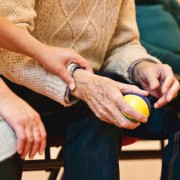Supporting Loved Ones During COVID-19 Pandemic
In light of current events, particularly the COVID-19 pandemic, it can become very difficult to support and care for the people we cannot physically be near. Social distancing makes it impossible to visit those we love. It’s easy to feel helpless when someone we love is sick, and even more so when we are unable to drop everything and run to be with that person. But there are ways we can still support loved ones during the Coronavirus pandemic from afar.
Providing Support While Social Distancing
While we may not be there physically, we can certainly continue to show people that we love and care for them. Below are 5 ways that to show you care while social distancing.
- Send food – Send gift cards from local restaurants with take-out options, arrange food delivery from nearby caterers, and research grocery distribution services that can bring necessities (that you have paid for) once, intermittently or regularly. Grocery shopping can be difficult for someone in crisis, but it’s a load you can easily help lighten.
- Be organized – Send your loved one reminders of appointments, personal goals, birthdays, etc. This will show them that they are still on your mind and you are still involved in their life. Also, be aware of their doctors, medical needs and any medications they should be taking regularly.
- Check in with primary caregivers – These individuals are your closet connection to the person in care during times of isolation. Check in with them to get daily updates on how your loved one is doing.
- Get connected – There are many apps that allow someone to provide care long-distance. The apps include features to help you keep track of appointments and medications with pre-set reminders or alarms. Surveillance systems installed in the patient’s home can allow long-distance caregivers to see a loved one from his or her phone and monitor activities or status from far away. Several medical on-call systems, some offered through local hospitals, provide assistance if something happens when a caregiver is not on site. New smart technology, like Amazon Echo or Google Home, can keep your loved one connected and able to call for help.
- Be prepared for emergencies – Even the most well thought out plans can become void if the unexpected occurs. Make sure you have a plan in place for emergencies that includes who to call, what to do and where to go. You can talk to your employer about how much time off you have, paid and otherwise. Pack a suitcase with everything you need in the event you have to leave in a hurry.
Support for Yourself
Being a caregiver in a long distance situation can be very stressful and burdensome. You need to remember to take time for yourself. Allow yourself to do things you like and that you find relaxing without feeling guilty. You can’t keep the way you are feeling bottled up inside. Talk to the people you trust. Accepting outside help from family and friends, being organized and prepared for whatever happens, and taking care of yourself will help you feel more confident about caring for someone you love from far away.
Orchard at Brookhaven is here to provide care for our residents when others may not be able to. We work closely with the families of our residents and allocate many of our resources to making Orchard feel like home. If you are looking for a senior living community in Atlanta for your loved one, contact us today and set up a time to come visit.










